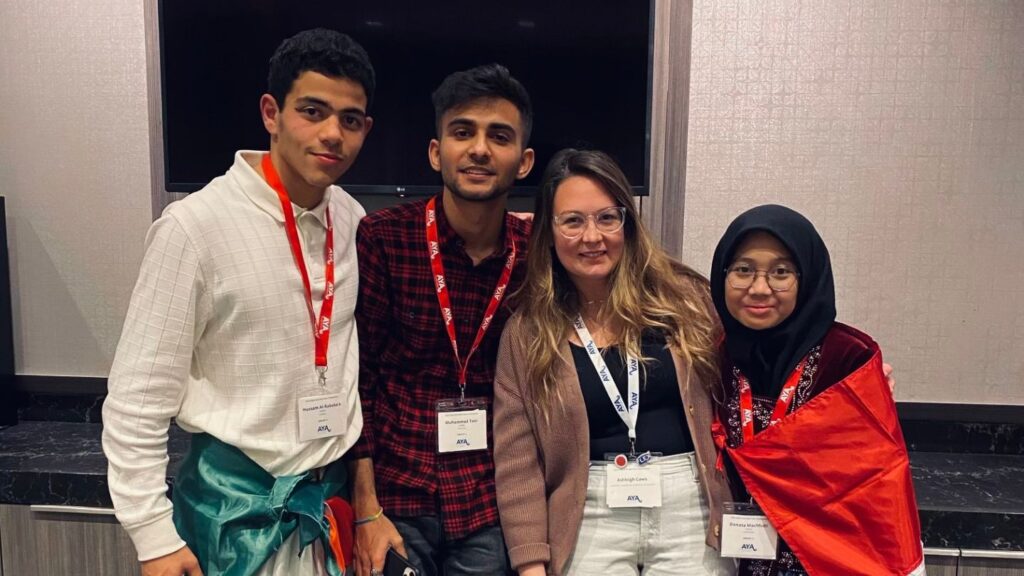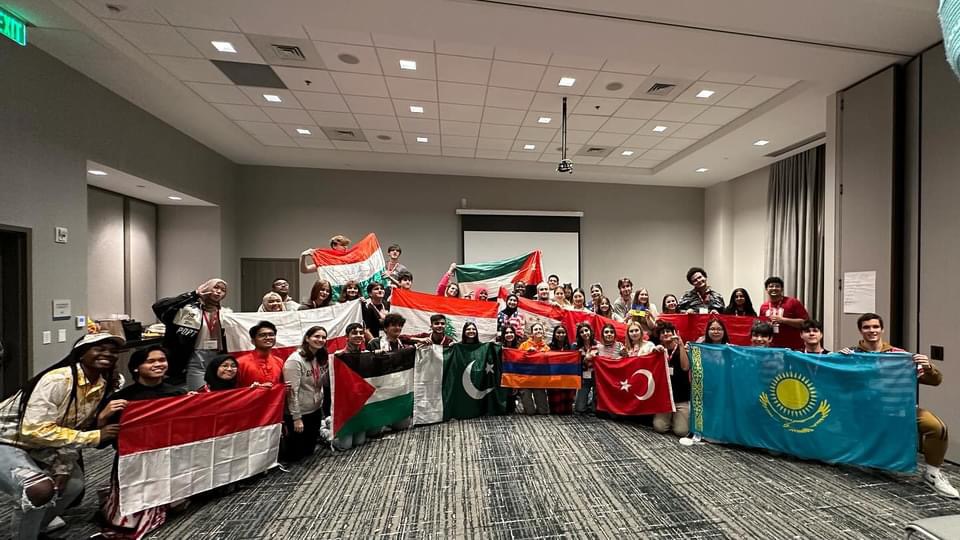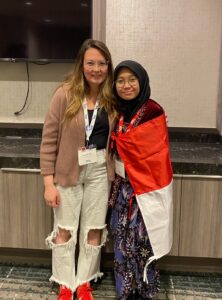
Each year, many high school exchange students across the United States observe the Muslim holiday of Ramadan.
To gain a greater appreciation and understanding of what an AYA exchange student observing Ramadan experiences, an esteemed member of our team committed herself to observing as well.
Ashleigh Caws is the Director of Operations & Special Programs at Academic Year in America (AYA). With over 10 years with the organization, Ashleigh has a unique perspective and has gotten to know countless international high school exchange students over the years.
“I am proud to head up a really special area of AYA that warrants the term, the YES and FLEX programs. Students who are awarded the coveted YES and FLEX scholarships bring a unique vibrance to AYA, and each year I watch a new cohort of high school students bravely come to the U.S. seeking the experience of a lifetime. They have their bags packed with their trendiest items of course, but they also carry with them cultural traditions and insights that are generations and centuries old. These students represent so much of the world’s diverse history, culture, and beliefs, and it is our greatest honor to welcome them to America for the very first time.”
After over a decade in the international education space, Ashleigh knows a student’s exchange experience can have ebbs and flows. One interaction with this year’s cohort of students reminded her of this, which prompted her to consider how she would handle similar situations.
“An exchange year has many ups and downs, every moment can be different to the next when you are experiencing a new culture for the first time. I have watched hundreds of students go through the process, each year and generation facing different challenges. This year at Mid-Year Orientation, AYA led a workshop about the skill of self-reflection in context to the exchange student experience. I found myself asking some personal questions internally as I saw the students discussing their challenges about connecting to host families, navigating American social environments, and steering themselves through conflict. I asked myself, ‘how would I navigate some of these problems?’ I overheard a student speaking about Ramadan and how she was worried about how her host family would react to her fasting. It clicked for me then.”
Experiencing Ramadan Firsthand
After years of advising students and host families about Ramadan, Ashleigh decided to experience it firsthand to better understand the challenges of observing the holiday. This journey began on her daughter’s first birthday, filling her with both nervousness and excitement.
“With well over a decade of international education experience, youth program oversight, YES and FLEX student connections, I had spoken about Ramadan many times. I had even given advice about it to host families and students! However, I was, speaking about something I had never experienced. I felt it was time I put myself in the shoes of our students and host families, embarking on the journey of Ramadan in America along with them. What a great opportunity to learn and reflect as an AYA staff member, but also just as a human being. As the sun set on March 10, I experienced a brief moment of panic but also a lot of excitement. It was my daughter’s first birthday and I had planned to eat cake and be merry, but I knew at midnight I was about to begin a 30 day journey, participating in Ramadan for the first time. I was ready!”
But what exactly is Ramadan? And how do high school exchange students navigate observing it in a new country while living with a host family who might be unfamiliar with the holiday and its traditions?
“For those reading who aren’t familiar, Ramadan, the ninth month of the Islamic lunar calendar, is a time for Muslims around the world to fast from dawn to sunset. The fast is not just about abstaining from food and drink but also from negative behaviors, with a focus on prayer, reflection, and community. It’s a period dedicated to spiritual growth, self-discipline, and heightened devotion. Our students often embark on Ramadan as a solo adventure, many informing their host family of a tradition that they had never even heard of. I have heard from students that this can either feel very exciting to share with them or incredibly isolating. Navigating the month with their natural families far away, and not joining in the festivities can be difficult. For me, participating in Ramadan alone was an important part of the experience, to truly feel like a student doing it alone in America. Overall, I found the experience profound and deeply rewarding, but such a challenge! I commend our students for their commitment while on the program!”
Adjusting Daily Routine for Ramadan
To truly get an appreciation for what high school exchange students who observe Ramadan experience, Ashleigh needed to make changes to her typical day-to-day routine. Doing so made her appreciate students’ commitment all the more — they are teenagers, after all!
“Adapting to fasting meant making lots of changes in my daily life. I was waking up before the sun rose and ensuring I had a pre-dawn meal. This was difficult at first, but I came to really enjoy this shift to meet the sun. I did think about students getting ready for school and maybe skipping this meal if it wasn’t prepared for them. I made a mental note to give some tips to a teen who may have to roll out of bed and go to school and feel tempted to skip this moment if they were feeling tired or experiencing some homesickness during this time.”
Fasting Challenges and Reflections
But it wasn’t just the adjustment to her morning routine that made Ashleigh reflect on exchange students’ Ramadan experiences.
“The rest of the day brought challenges, too! Wanting to snack when I was stressed or hungry; no excuses to get up from my desk for some tea when I felt the urge to avoid a hard task; smelling everyone else’s delicious lunches; feeling tired or dehydrated if I exerted myself; preparing food for my family when I couldn’t eat with them, all things I experienced daily. I thought of students doing school sports in the afternoon heat and wondered what they did during their lunch periods. Some schools do give access to prayer rooms which is wonderful, but that is not always the case. I wondered where students typically found solace during school hours to focus on prayer and how they juggled their busy teen lives during Ramadan.”

Finding Strength in Reflection and Community
Ashleigh’s participation gave her a deeper understanding of how exchange students’ spiritual practices helped them remain dedicated to the traditions of Ramadan.
“It was in these moments of hunger and thoughts that I understood the significance of the prayer meditation and reflection. It gets you through the hard times and helps you to recognize moments of quiet and gratitude. When I was tuned in to the spiritual elements during the difficult hours of these days, I found a lot of peace and strength to continue.”
She also became enlightened about — and inspired by — the impact of community.
“I can also see how community plays a role in Ramadan, and how it isn’t accessible to all our students during this time. Community fosters connection at the end of these long days, sharing spiritual ideas and collective consciousness. It is clear to me now that a focused effort in creating tangible community for students participating in Ramadan is essential. I saw some of AYA’s YES and FLEX clusters celebrating together on Facebook posts and that was really encouraging. I can only imagine seeing other students doing it with you would be really motivating, it was certainly motivating to me! At AYA we educate Local Coordinators and host families to be supportive of students, but it has really helped me to understand the types of support that are likely most helpful. Our students do a really great job of navigating this time and staying true to themselves. Truly commendable!”
Profound Gratitude and Growth
Ashleigh found the Ramadan experience fulfilling, as it gave her a profound appreciation for the little things in life and underscored the need for prioritizing being deliberate in her actions.
“Overall, I really enjoyed this experience. In the final weeks I really leaned into it and found my body and soul really had needed the cleansing break. It instilled a profound sense of gratitude for the simple things I often take for granted and showed me that prioritizing time for myself and my needs is really important. The discipline is something I was lacking previously and the shift in mindset was fundamental as a new mom and a busy AYA staff member. I also learned the importance of intention.”
Final Thoughts
Ultimately, Ashleigh is incredibly glad she took the time to experience Ramadan and encourages others to learn more about it themselves.
“My strongest take away was making a conscious effort to meet the day instead of having the day meet me. For anyone contemplating experiencing Ramadan, even if just in solidarity with your student, I wholeheartedly encourage it. I felt more capable to tackle challenges, felt calm in conflict and felt self-assured in a way I had not felt in years. I felt grateful to have so many wonderful young people to look up to in the AYA community, and truly appreciative of the impact we can have with these programs! Ramadan is certainly a journey worth taking!”
Did you know you can experience new holidays and traditions like Ramadan by hosting an exchange student?
Host families from across the United States come in all shapes and sizes. Whether you’d like to host for a full school year, a semester, or just for a few weeks as Welcome Family, you can make an impact on an exchange student’s life by hosting!

Leave a Reply